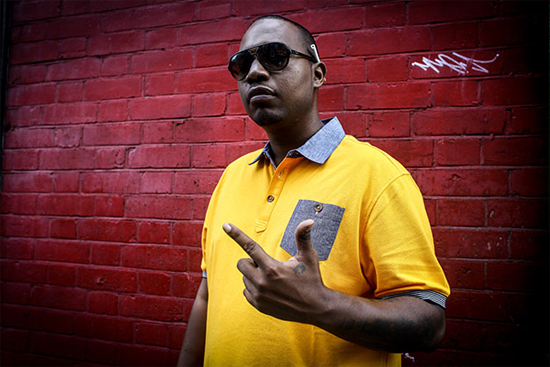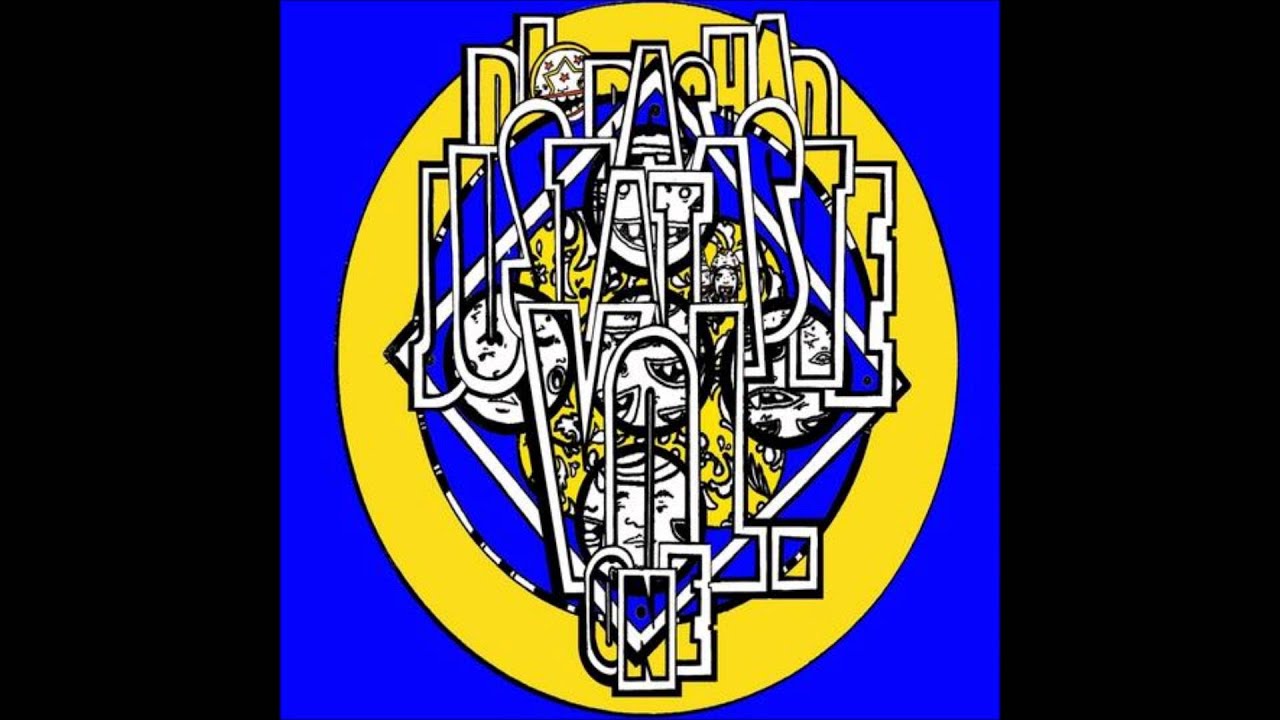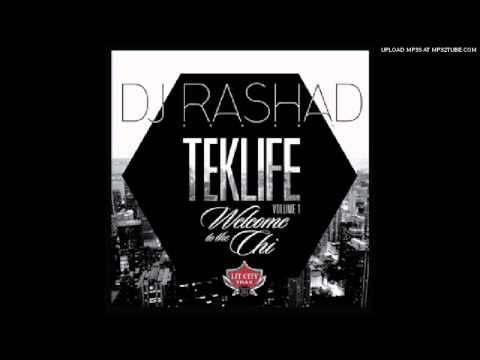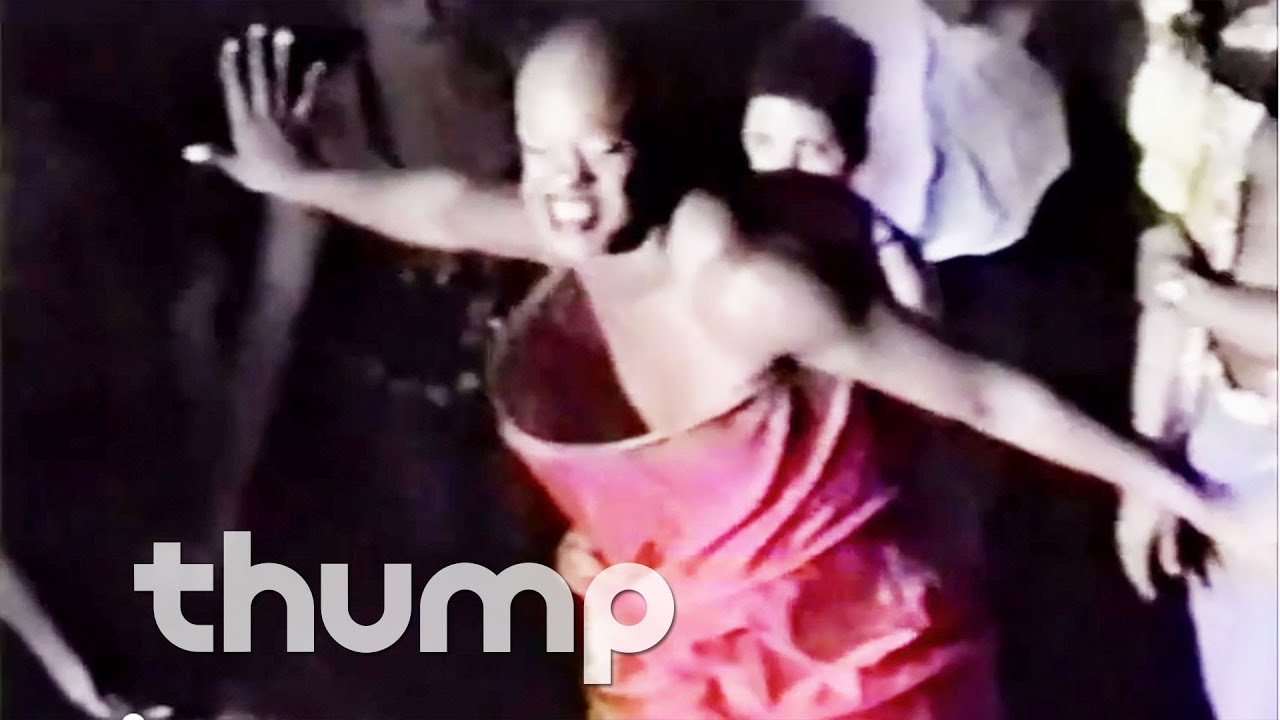I’m writing this edition of Hyperspecific on the same day as the shocking and sad news that Rashad Harden, aka DJ Rashad, has passed away at the age of only 34. Founder member of the Teklife collective and one of the pioneers of footwork, in recent years he was also a pivotal figure in the genre’s remarkable expansion beyond its own city to wreak glorious havoc on dancefloors worldwide. My own sadness as a fan will of course be outweighed a hundred fold by the grief of those that knew him personally, and there have been some moving tributes written by his friends in the last couple of days. But before this column’s usual run-down of new releases, I wanted to take a few moments to reflect on my own experiences of his music and what made it so unique.
I can still vividly remember almost every detail from the first time I caught Rashad playing in a club, alongside his close friend and frequent collaborator DJ Spinn in a humid basement in Krakow, Poland. That was in part to do with the music itself, of course: the first time you experience footwork on a dancefloor it feels like being rewired. Its multi-directional rhythmic torque, so distinct even from ostensibly similar genres like jungle, proves initially disorienting but also energising, tactile and deliciously new, as if previously separate sensory and motor regions of your central nervous system have been abruptly and rudely patched together.
But beyond that, the reaction of the crowd – predominantly European and about as far as you could imagine from the heated dance battles that gave rise to the genre in Chicago – was, if anything, even more striking. It was 2011, less than a year after the release of Planet Mu’s first Bangs & Works compilation that helped to introduce the sound to global audiences, and at least where European clubs were concerned footwork (and its twin sister style, juke) was still being discussed as something of an unknown quantity. On the one hand it was seen as a uniquely functional sound which, although often confounding on headphones, would come to life on the floor. Yet on the flipside, it could be fiendishly tricky: would its see-sawing rhythmic vortices and scattergun sample shrapnel simply tie the limbs of unpractised footworkers in knots?
Far from it; the reaction was one of utter exhilaration. Descending the stairs into the basement the strobing suckerpunch throb of sub-bass through the walls was accompanied by a wall of sticky heat, an abrupt sensory shock from the chilly October air flowing through the rest of the venue. Inside the room the music was raw, rapid-fire and surging with energy. Phases of driving, foursquare hat-snare patterns drew arrow-straight trajectories for brief periods, gathering momentum before the next track’s arrival abruptly splintered the mix outward like an exploded architectural diagram: bass bucking hotly like a motorcycle engine, sampled singers and rappers’ words stammering and slashing away at each other, hi-hats slipping the grid, typewriter snare jabs like punctuation marks, their dessicated funk ricocheting through space and bodies. Heading proceedings in the booth at the front were Rashad and Spinn themselves, sporting gleeful grins, taking photos and pouring their own energy back into the room. The crowd, including many current and future friends of my own, willingly completed the feedback loop, transforming into a sweat-soaked, kinetically-charged tangle of bodies within minutes. Both the sense of joyful abandon and the warmth between DJs and crowd was tangible; both parties seemed to feel equally excited at the explosive force generated through this meeting of worlds – an interaction that has continued to bear fruit and generate amazing music in the time since, as producers around the globe have internalised ideas from footwork and Chicago artists, led by Rashad, have responded by broadening their own music’s reach.
That night remains high up among my favourite and most memorable club experiences partly for the sheer sweaty abandon of it all, but also because it was wonderful to witness friends with all manner of music tastes spontaneously and collectively losing their shit for two hours, as Rashad and Spinn together debunked any perception of footwork as ‘difficult’ dance music without sacrificing an ounce of its intoxicating strangeness. That same characteristic was central to Rashad’s music over the past couple of years, which widened to draw influence from and link to other genres and artists, engaging with the broader global bass music community without losing any of its distinctive personality along the way – jungle’s stretched breakbeats and southern hip-hop hi-hat slurs enmeshed among gooey Rhodes melodies and jabbering voices.
Albums like Teklife Vol. 1: Welcome To The Chi and last year’s supreme Double Cup for Hyperdub, as well as the Rollin’ EP’s raw soul, found him achieve a rare balancing act: becoming increasingly accessible while simultaneously becoming even more compositionally innovative, emotionally resonant, generous, playful and darkly humorous. Certainly there have been few tracks in recent memory that have given me the kind of simultaneous physical and emotional sucker-punch as ‘Rollin’, ‘On My Way’, or the exquisitely unsettling, smoky older track ‘Ghost’, with their beautifully-judged soul-sample collage and linguistic trickery hammered viscerally home by sparring jabs of bass and drum. If you’ve not spent much time investigating his music to date, I’d urge you to do so. His death is a deeply saddening loss, and my thoughts and sympathies are with his family, friends, and all those that knew and worked with him.
Throwing Shade – 19 Jewels
(No Pain In Pop)
‘Sweet Tooth’, which opens Londoner Throwing Shade’s second EP, emerges in a cascade of sharply luminescent synthetic tones, cast in hues of gauzy gold and silver. They’re gradually joined by additional sound sources: what sound like bells, singing bowls, beats studded like gems in metallic surrounds, all filling the mix until the track towers around Emily Bee’s spoken vocals. Its pillowy textures could easily bleed into background sound, but the track remains an oddly commanding presence, grasping the attention from the off and refusing to relinquish it. The rest of the EP, 19 Jewels, is similarly impressive; it finds her expanding on her 2013 debut (released on Kassem Mosse’s Ominira label) by muddying the waters further, crafting pristine beat landscapes that become even more cryptic with repeat listens, subtly deflecting any attempts to decipher them. So ‘Once’ drowns brittle, grimey beat-blasts and popgun snares in restless seas of shimmery electronic drone, a tactic which serves to both strip them of forward momentum and heighten the mood of cautious unease. ‘Real Bad’s sampled sentence repeats, mantra-like – "want you real bad" – but with a robotic tang that creates an intriguing twist of dissonance against its supple, tactile musical surrounds.
A graduate in ethnomusicology and NTS Radio DJ whose show gathers regional musics from around the world, Throwing Shade’s Nabihah Iqbal has had significant experience in playing and studying a wide variety of musical forms – in an interview last year she mentioned playing in Turkish, classical Thai and both Balinese and Javanese gamelan ensembles, as well as orchestras and jazz groups. That breadth of interest is audible in the way her own music unites signifiers of various forms of global music, both traditional and contemporary, without explicitly anchoring itself in any one place. It possesses that particularly placeless, fourth-world atmosphere that’s almost inevitably become a common characteristic of internet age electronica, but is refreshingly unselfconscious about it. The raindrop-like plucked melodies that materialise during ‘Real Bad’ conjure up a fleeting impression of traditional Chinese music. It’s hard not be reminded slightly of Fatima Al Qadiri’s upcoming Asiatisch album, and its concept-framed explorations of "imagined China" as refracted through the mirror of a handful of mid-2000s grime productions. Yet the latter feels somewhat boxed in by the rigidity of its central conceit, which offers only one prism through which to interpret its otherwise dazzling cut-glass textures and melodic flourishes. In contrast, it’s the ambiguity of 19 Jewels that makes it such a rewarding listen; you’re presented with a series of sensations and motifs, and left free to formulate your own emotional and intellectual responses to them.
copeland – Because I’m Worth It
(copeland)

"The city is yours," offers Inga Copeland on ‘Advice For Young Girls’, a collaboration with Actress whose kitchen sink percussion and monotone, shoe-scuffed static loops are vaguely reminiscent of the latter’s recent Ghettoville. "You will see all of the lights, hear all of the music; it’s yours. The city is yours."
What manner of city, though? Ghettoville felt like future projection, a deeply unnerving yet perversely fascinating sketchbook detailing the likely after-effects of toxic shock doctrine neoliberalism and the purging of urban London’s poorer communities: decaying housing blocks standing empty and awaiting demolition, soon to be replaced with shiny new developments for upwardly mobile young financial professionals; sterile streets and chain bars where active local economies once existed; those left skint and homeless left skulking in alleyways. It was ugly, grime-caked, almost too real, yet you couldn’t look away. By comparison, the alchemical drone ‘n’ bass of Hype Williams, and the post-projects that both Copeland and former bandmate Dean Blunt have embarked upon since, have concerned themselves with a young person’s experience of urban space in the ambiguous, insecure ambience of now. Both as a duo and now solo, they’ve created expressive sonic maps of the minutiae of multicultural London life: syrupy bass murk from sound systems and car stereos merging with the background roar of engines and street chatter, police car sirens, drunken voice messages, time-stretched breakbeats and grime bars, deep stoned coughs, goofy internet memes, drug banter.
Rather than existing as wholly standalone entities, Copeland’s recent releases have taken further steps along that narrative continuum leading from Hype Williams – especially the duo’s masterpiece to date, 2012’s Black Is Beautiful – towards an unsure future. There’s ominous portent buried in there: Copeland’s excellent free Higher Powers mixtape from last year reflected on jobless frustration and boredom ("in the city I live, we get high for no reason at all"), while her new album as copeland is titled Because I’m Worth It, a sarky dig at advertising and consumer culture. But there’s also joy in the mix too, memories of nights spent in a haze in front of a massive rig, days slumped in a pleasurable fug on the couch. The beats that ripple through Because I’m Worth It – a characteristically cryptic suite of electronic dub – are more sharply defined than ever before, forming an insect-legged jungle quickstep on ‘Insult 2 Injury’ and an early Loefah-esque scuttle on ‘L’Oreal’, but they still register as if through one level of mental remove, with dub siren bloops and roughly-daubed delay rendering the perceptual space around them fluid and unstable. ‘Serious’ is a brief gamelan-esque assembly of melodic struck percussion; ‘Fit 1’ is elegant and elusive pop, with Copeland’s delivery almost conversational amid snaking melodica lines.
Alongside a nod to Wu Tang’s ‘C.R.E.A.M’, ‘DILIGENCE’ reprises a lyrical fragment from a Hype Williams song – "got my mind on my money or the other way round" – but rather than framed in the pillowy lovers’ dub of its former incarnation, here it’s delivered with a barbed, stinging proviso: "it’s all being measured, judged, looked at". Indeed, if the emotions explored here often feel rather more personal than the ecstatic communal disorientation of Hype Williams’ later live shows, they’re still pin-sharp reflections of the very real difficulties faced by young women, as well as those faced by young people in general, at a time when our right to the city as a space for communal activism and shared experience is increasingly being denied from us.
Allison Chanic – Painlessly In Love
(Bedouin Records)
Not meaning to keep returning to Ghettoville, but there’s something to this great new 12" from Swedish artist Allison Chanic that reminds me of that album’s ability to hold the attention over extended runtimes using only the most basic of motifs. ‘Painlessly In Love’ and ‘Realm’ build upon minimal foundations – each a single looped glimmer of melody-infused static – and above them gradually construct towering edifices of translucent building material, disembodied sung vocals and shutter-shot beats. Both tracks were apparently written following the disintegration of a long relationship, and there’s something to their hermetic nature and instability – her voice is heavily processed, cut up or markedly pitchshifted to mask the lyrics and make the music wordless – that suggests a retreat from the outside world into a pre-language protective cocoon of the self, a space for reflection and post-traumatic contemplation. With the music here expansive and affecting, it’s a pleasure to be allowed these glimpses into that zone.
It’s the first time I’ve come across Chanic’s work, though she’s been active since the 1990s, both solo and as part of the band Amphex. This is also the first release from the newly founded Bedouin Records. Apparently based in the UAE but distributed in small pressings by Honest Jon’s, and with future releases to come from an international roster of musicians, this forms an impressive opening salvo. Dublin techno duo Lakker, who have been on particularly strong form recently (their recent Containing A Thousand for R&S is well worth your time), round out the EP with a foggy, motorik churn of a ‘Painlessly In Love’ remix cast in lush shades of green and grey, which blossoms with new growth like a desert after a long-overdue rainstorm.
Ital & Halal – The Day After
(Lovers Rock)
If you buy only one, err, outsider techno collaborative team-up 12" this month, make it The Day After, in which Ital and Aurora Halal blast off on a four-track voyage through strung-out, wired club music of various hues. A veteran of the US’ noise and post-noise scenes, following a couple of pleasurably jarring full-length Ital albums Daniel Martin-McCormick has recently plunged off the deep end into intricate, aquatic forms of house. Aurora Halal, who runs the Mutual Dreaming parties in Brooklyn, was formerly one half of 100% Silk duo Innergaze but has since swum into solo waters herself: earlier this month she released her impressive solo debut EP Passageway, which I reviewed in last month’s edition of this column.
The Day After is slightly removed from both artists’ solo work, in that it sounds like they’ve egged each other on in the studio to make proper club bangers. ‘Ascension’ is focused and predatory, a feast of miniature bulbs of saturated sound whizzing around a central fulcrum like fire poi around a dreadlocked juggler at a dreadful European psy-trance festival. Even ‘Phase 2’, which emerges from a dense cloud of Chain Reaction-style reverb, betrays the restlessness at its core when its bouncing ball of a bass motif slowly ushers the track into orbit, and your mind along with it. As is often the case with current techno, there’s nothing especially new about the duo’s deep-ocean-gazing explorations, but with tracks this sleekly refined that’s not really the point. Oh, and simple pleasures perhaps, but there’s nothing quite like a good kickdrum, and ‘Thirst’ boasts some of most satisfyingly taut and springy kicks this side of Robert Hood – or, for that matter, the latest release from Berlin’s Call Super.
Call Super – Depicta
(Houndstooth)
It might sound odd to praise music for its shelf life, but given that plenty of dance tracks let all of their secrets go first time round, there’s something entirely satisfying about the slow-burning aesthetic fostered by Call Super’s JR Seaton. I’m still finding new things to admire in his 2013 EPs for Houndstooth as well as his recent Ondo Fudd 12" for Trilogy Tapes. Like peeling away extra layers of skin and muscle to reveal new regions of complex anatomy pulsing away beneath the surface, his tracks show their hand slowly, with brief harmonic interactions between fragmentary elements emerging into 3D as if from a magic eye picture. That’s reflected in their flexibility in a club context; despite rattling along at a fair old pace, Call Super tracks are ambiguous enough in energy and mood to avoid being prescriptive in their effects on dancers, though they’ve certainly got the potential to send people wild at the right moment. ‘Acephale II’, from his latest 12" on Houndstooth, is a great example: slow in pace, built around a subtle shudder of a three-note motif and eddying metallic tones that glint like motes of dust in afternoon sunshine, it’s nonetheless exciting enough to make me long to be airlifted immediately to the nearest good 5am dancefloor. It’s presumably titled after Georges Bataille’s 1930s publication Acephale (which discussed Nietzsche and fascism); the title translates to ‘headless’ in Ancient Greek, which also rather pleasingly encapsulates what I imagine the track’s impact to be on a late night club crowd. A-side ‘Depicta’ is woodier and more bucolic but equally engaging, build atop kicks that thunk like a nailgun into plasterboard.
As well as the storytelling aspect present in track titles and artwork, the melodic and harmonic complexity of Seaton’s music – which owes a certain debt of influence to the Dopplereffekt school of electro-romanticism – is refreshing in a post-Ostgut and post-Sandwell era when those qualities, so central to the earliest iterations of techno and electro and the funk and pop musics that inspired them, are so often reduced to a lazy one-held-note foggy drone, half lost in a mire of billowing warehouse boom-kicks. (Even respected operators like Shed, who is capable of striking a great balance between austerity and woozy post-‘ardkore romanticism, have been falling prey to this as of late. Perhaps this is a particularly UK-centric perspective, but the hollow thump of the Berghain sound tends to get lost in translation to London’s markedly less cavernous, generally-a-bit-shit larger techno venues.) In any case, it bangs on a dancefloor: a recent all-night back-to-back session in London between Call Super and friend and fellow Berlin resident Objekt was an absolute treat, contextualising their own idiosyncratic takes on subloaded techno with five-hours accelerating from an opening phase of dubby sounds and old Warp material to a breakneck final hour that, as I recall from my hazed state, included well-timed classics from both Goldie and Octave One.
MikeQ & DJ Sliink – ‘The Bitch’/’Werk’d It’
(Fade To Mind)
Dat Oven – Icy Lake
(Night Slugs / Fade To Mind)
Alongside footwork, the contemporary US ballroom sound is current evidence for the truism (so often witnessed in the past) that the bulk of dance music’s most striking rhythmic innovations are driven not by experimental fringe artists, but by the functional needs and desires of bodies on the floor. In both cases the music has been shaped by its specific purpose within its particular environment. Footwork evolved from ghetto house and juke in Chicago gyms and halls, incited to ever greater heights of percussive affray through its symbiotic relationship with the virtuosic, rubber-limbed dance battles that gave the genre its name. And in the case of ballroom producers like MikeQ and Vjuan Allure, their staccato, arch-backed, distinctly electronic recastings of classic house signifiers initially emerged to soundtrack performers at contemporary vogue/ballroom nights, which have remained an ongoing phenomenon in the US LGBT underground community since long after Madonna’s ‘Vogue’ and Paris Is Burning briefly introduced voguing to wider pop culture.
MikeQ, who has been involved in the underground ballroom community as a producer/DJ for a decade and has developed a signature tough, brittle sound, has emerged to wider attention in the last couple of years, in part due to his involvement with Night Slugs sister label Fade To Mind. His 2012 Let It All Out EP for the label was a formidable introduction, its double and triplet kickdrum salvos lending the music a tough, stiffly funky gait, shrouded in arcs of freezing fog and vocal chants co-opted as verbal commands to dancers. This month, Fade To Mind opened its new Mind To Mind series of collaborative 12"s with the pairing of MikeQ and Jersey club producer DJ Sliink, and the results are as fierce as you’d expect. ‘The Bitch’ riffs on the vocal from MikeQ’s ‘Let It All Out’, spattering slivers of human voice through a windmilling drum pattern prone to abrupt, jarring shifts in vector, throwing you off balance. ‘Werk’d It’ on the flip is as haughty as they come, its kicks ricocheting off each other and the few other sparing elements in the mix like a madcap pinball machine.

Also out this month is a pretty essential joint release between Night Slugs and Fade To Mind, the first they’ve released as a wholly collective endeavour: a reissue of Dat Oven’s thumping 1998 ballroom house anthem ‘Icy Lake’, with remixes from members and associates of the two label collectives. If you’ve not already checked it out, I’d highly recommend you take ten minutes to watch their documentary (embedded below via Thump) on the origins and history of the track; as well as being a history lesson in its own right, it’s a potent reminder of dance music’s ability to encode a huge amount of personal and collective meaning within a single piece of music.
‘Icy Lake’ itself offers shivers up the spine, via a three-note descending semitone-tone motif, icicle clicks, and an ominous sampled answerphone message: "I just thought I’d call before I throw myself into the icy lake". Watching the documentary reveals that the message was intended as jokingly melodramatic rather than a serious cry for help. Nonetheless, in the context of a track that was a hit in late 90s ballrooms, it can’t help but take on a twist of additional meaning of its own, reflecting back upon the gender identity issues, depression, substance misuse, illness and alienation experienced by many within the LGBT and ballroom communities at the time. In a current globalised bass music world that can tend towards the exploitative – and is often at best overly self-referential and ahistorical – this reciprocal, respectful involvement with such socially pertinent and politicised dance music culture is to Night Slugs and Fade To Mind’s credit. I’m not sure who else is even coming close to doing that at the moment.
Listening back with hindsight, ‘Dat Oven”s hard angles, acres of space and shifts into rhythmic freefall make it feel like a clear precursor to grimey aesthetic of both labels, so it’s hardly surprising that the remixers enact compelling transformations on the original: two L-Vis 1990 versions that set slashing percussion in a backdrop of Arctic silence; a splintered, rapid-fire juke version from DJ Rashad and Nguzunguzu’s NA; and a dramatic reframing from LA’s Total Freedom, whose DJ sets and wildstyle R&B-club-concrete bootlegs have been recent obsessions of mine (you can find loads of them here).
Gage – ‘Telo’/’Shiftin’
(Crazylegs)
With grime in mind, perhaps the most intriguing – and somehow eerie – properties of Dat Oven’s ‘Icy Lake’ are the N64 Mario Kart icicle clicks that rebound across its surfaces, which will sound familiar to any grime fans as one of the defining sonic motifs of Wiley eskibeat riddims like ‘Ice Rink’. In both cases they’re used to express a very similar emotional state – wired, nervy, yet coolly playful – except this track was made in 1998, several years before they were made musically famous by the grime leading light, and long before their recent adoption by plenty of young producers wishing to declare some allegiance and awareness, however facile, of the genre’s past.
It’s great that the critical discourse has turned back towards grime; as artists like Bok Bok and Slackk, as well as some perceptive friends of mine, noted at the time, even as recently as three or four years ago it was much more rarely discussed with reference to collectives like Hyperdub and Night Slugs and the prevailing ‘post-dubstep’ era in general. It’s even better in many ways that the sonic innovations of its earliest pioneers are now being reconsidered by a growing host of younger producers keen to open up new pathways forward. In the wake of Night Slugs’ killer Club Constructions series and Jam City’s prescient (and influential) Classical Curves album, some of the best new UK dance music has melded influence from US styles like ballroom with grime – two genres themselves not so distant from each other in tone and texture.
Nonetheless, lots of the neo-grime/post-grime/Grime 2.0/what-you-call-it music emerging at the moment is a reminder that this is a still-developing aesthetic; there are no shortage of devil mix-style instrumentals and what-the-fuck moments to rival freakouts like Untold’s slithery 2009 beast ‘Anaconda’, but there’s frequently a sense that shocking impact is being prioritised over momentum, a potential pitfall for music made without particular concern for whether an MC will hop on the mic to channel some of its raucous power and close the circle.
These beats do however come to life, albeit still sometimes rather unevenly, in the mix; Truants’ Functions Of The Now series is particularly worth checking out, with several of its installments a reminder that the most exciting moments on a dancefloor arrive when your frame of reference for what you’re experiencing is abruptly upended. The recent instalment from Bristol producer Gage is hugely enjoyable; his debut 12" has also just come out on the city’s Crazylegs label, which contains a pair of spring-loaded, chilly-as-hell beats, all barbed percussive boinks and abrupt plunges into an airless vacuum.
For all that tracks like this can risk sending the mix flying off in all directions unless wielded carefully, there’s still something undeniably fascinating about young producers and DJs crafting a dancefloor aesthetic that makes such use of stark, profoundly empty space. Compared to the bare-bones, relatively lo-fi nature of early grime, these tend to imagine the genre as a heavily processed, hi-res, cybernetically-enhanced version of itself, pumped up with extra steroids gleaned from advances in cheaply accessible production technology in the last decade. If anything it would be exciting to hear this stuff get even more fucked up, keep the groove present (and sling in a few more hi-hats for momentum) but mangle and twist the textures further, the better to send bodies into states of disarray on the floor. It’s not grime per se, but with that in mind, a parting shot for this month is a recommendation to check out ‘Bored 2’, from Beneath’s new Vobes EP on PAN, a wracked monster of a near-beatless track with a uniquely cantankerous, sound system wrecking edge.
Hyperspecific returns next month with another selection of dance and electronic music, fresh plucked from the factory floor





